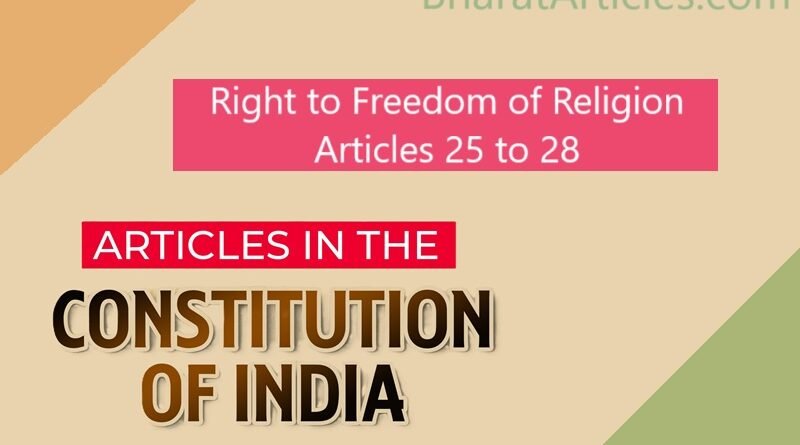Right to Freedom of Religion: Articles 25 to 28
The Right to Freedom of Religion is a fundamental right enshrined in Articles 25 to 28 of the Indian Constitution. It guarantees religious freedom to all individuals and ensures that the state remains secular, treating all religions equally. This right reflects India’s commitment to pluralism and its respect for the diverse religious beliefs of its citizens.
Article 25: Freedom of Conscience and Free Profession, Practice, and Propagation of Religion
Key Provisions:
- Freedom of Conscience: Every individual has the right to hold and practice their religious beliefs.
- Freedom to Profess, Practice, and Propagate:
- Individuals can openly declare their faith, perform religious rituals, and spread their beliefs.
- However, this freedom is subject to public order, morality, and health.
- State Regulations: The state can regulate or restrict secular activities associated with religion, such as economic or political activities.
- Social Reforms: The state can intervene in religious practices to promote social welfare or reform, such as abolishing untouchability or harmful practices.
Landmark Cases:
- Stanislaus v. State of Madhya Pradesh (1977): The Supreme Court held that the right to propagate does not include the right to forcibly convert others.
- Bijoe Emmanuel v. State of Kerala (1986): The Court ruled that students could not be compelled to sing the national anthem if it violated their religious beliefs.
Article 26: Freedom to Manage Religious Affairs
Key Provisions:
- Right to Establish Institutions: Every religious denomination or section can establish and maintain institutions for religious and charitable purposes.
- Management of Affairs: Religious groups can manage their own affairs in matters of religion.
- Ownership of Property: They can acquire and own movable and immovable property.
- Administration of Property: They have the right to administer property in accordance with the law.
Landmark Cases:
- Shirur Mutt Case (1954): The Supreme Court ruled that religious denominations have the autonomy to decide matters of religion.
- Durgah Committee v. Syed Hussain Ali (1961): The Court clarified that only essential religious practices are protected under Article 26.
Article 27: Freedom from Payment of Taxes for Promotion of Any Religion
Key Provisions:
- No Compulsory Contribution: No person can be compelled to pay taxes specifically meant for the promotion or maintenance of any religion.
- Secular Use of Taxes: Public funds cannot be used to favor or propagate any particular religion.
Judicial Interpretation:
- Commissioner of Hindu Religious Endowments v. Lakshmindra Tirtha Swamiar (1954): The Court clarified that fees for regulating religious institutions do not violate Article 27.
Article 28: Freedom from Religious Instruction in Educational Institutions
Key Provisions:
- Prohibition in State-Funded Institutions: Religious instruction is not permitted in educational institutions wholly maintained by state funds.
- Exception for Endowments: Institutions administered by the state but established under religious endowments can provide religious instruction.
- Voluntary Participation: No student can be forced to attend religious instruction or worship in institutions recognized or aided by the state.
Landmark Cases:
- Aruna Roy v. Union of India (2002): The Supreme Court upheld the inclusion of a secular study of religions in schools as part of value education.
Significance of the Right to Freedom of Religion
- Preservation of Secularism: Ensures the state remains neutral in matters of religion.
- Promotion of Pluralism: Allows diverse religious practices to coexist peacefully.
- Protection of Minorities: Safeguards the rights of religious minorities and prevents majoritarianism.
- Social Harmony: Encourages mutual respect and understanding among different religious communities.
Restrictions on the Right to Freedom of Religion
The freedom under Articles 25 to 28 is not absolute and is subject to:
- Public Order, Morality, and Health: Practices that harm public order or morality can be restricted.
- Social Reforms: The state can intervene in religious practices that contradict social welfare, such as caste discrimination.
- Regulation of Secular Activities: Economic, political, or secular activities associated with religion can be regulated.
Challenges and Criticisms
- Religious Conversions: Allegations of forced or incentivized conversions often create social and political tensions.
- Essential Practices Doctrine: Judicial determination of what constitutes “essential” religious practices is controversial.
- Conflict Between Rights: Balancing religious freedom with other fundamental rights, such as equality and freedom of expression, remains a challenge.
- Misuse of Freedom: Some groups misuse the freedom to propagate religion to incite communal disharmony.
Read This: Landmark Judgments in India
Conclusion
The Right to Freedom of Religion under Articles 25 to 28 embodies the essence of India’s secular and pluralistic ethos. It ensures that individuals can freely practice their faith while maintaining the state’s neutrality in religious matters. However, the effective realization of this right requires a delicate balance between individual freedoms, social harmony, and constitutional values.

